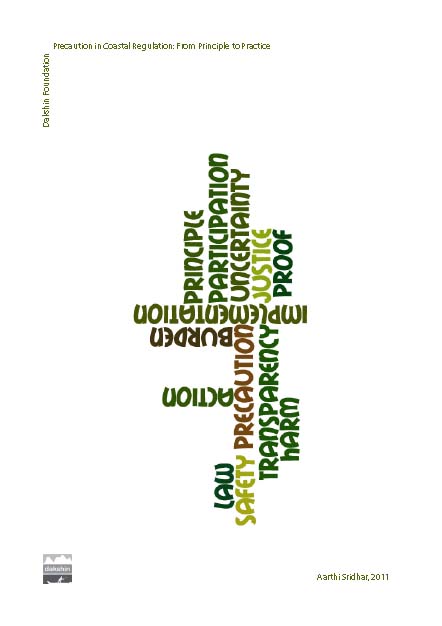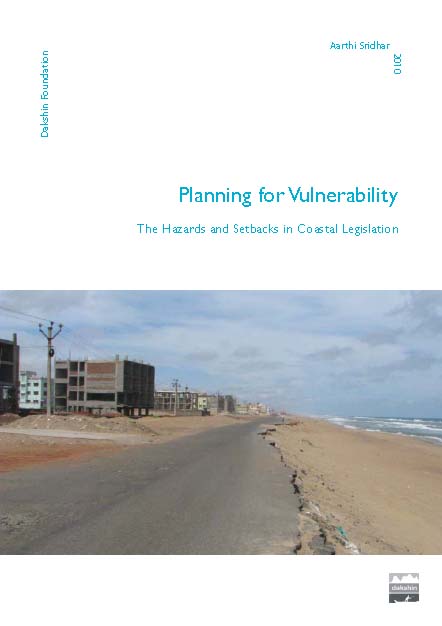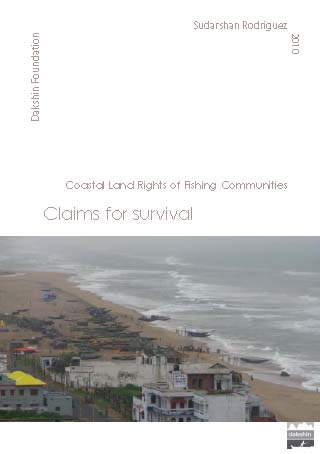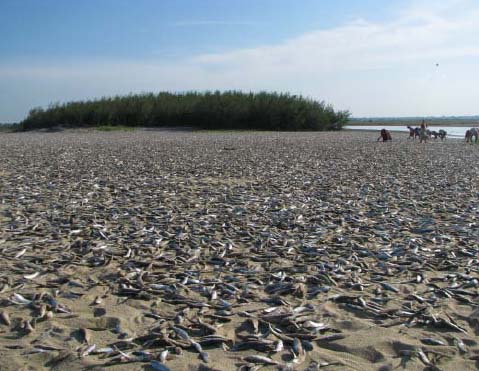Dakshin Foundation
Precaution in coastal regulation - From principle to practice – A report by Dakshin Foundation
Posted on 21 Jun, 2011 11:45 AM The decision to act or not act, and further how to act in the face of unknowns or uncertainties is the subject matter of the precautionary principle (PP). It is against this historical backdrop of unknowns in environmental governance that the present study on the precautionary principle was conducted.
The decision to act or not act, and further how to act in the face of unknowns or uncertainties is the subject matter of the precautionary principle (PP). It is against this historical backdrop of unknowns in environmental governance that the present study on the precautionary principle was conducted.
The present framework for environmental governance provides a number of areas where precaution can and must be applied. In addition to these areas, the present report is the outcome of a descriptive study that shows the extent to which key elements of the precautionary principle are embedded in the specific case of two environmental laws related to coasts. The study examines key areas of the clearance continuum (law-making, clearance and monitoring) through a single broad question: To what extent is the approach of precaution embedded in decision-making under the CRZ Notification 1991 and the Water Act, 1974?
Sridhar attempted to examine this question on a continuum that examines a) the text of the law, b) the conditions under which projects are cleared or rejected and c) issues related to the monitoring of these conditions. The Asia and Pacific Workshop Report of the Precautionary Principle Project declared that there are both explicit and implicit uses of the precautionary principle. It states that there are some instances where the PP’s application is explicit and unambiguous whereas in other decisions the PP is implicit. They also raise an important point that to actually determine whether a decision was indeed precautionary or not (where it is not explicit) requires an examination of the context and motivations for decisions and management interventions.
Planning for vulnerability - The hazards and setbacks in coastal legislation – A report by Dakshin Foundation
Posted on 22 May, 2011 06:16 PM The law pertaining to coastal spaces – the Coastal Regulation Zone (CRZ) Notification, 1991 specifically decides what people can and cannot do on the coastal stretches of the country.
The law pertaining to coastal spaces – the Coastal Regulation Zone (CRZ) Notification, 1991 specifically decides what people can and cannot do on the coastal stretches of the country.
Harbouring trouble - The social and environmental upshot of port growth in India – A report by Dakshin Foundation
Posted on 22 May, 2011 12:04 PMBesides its own impact, port development is often accompanied by other activities such as the location of industries, power plants, railway lines, highways, hotels, SEZs, residential complexes, etc., that have multiple detrimental impacts – environmental, social and erosion related.
Claims for survival - Coastal land rights of fishing communities – A report by Dakshin Foundation
Posted on 22 May, 2011 09:25 AM Marine-coastal ecosystems and coastal communities are poorly represented in the public debates on India’s social and environmental problems. Coastal and marine ecosystems are the backbone of a fisheries economy that supports livelihoods of millions directly and several more indirectly.
Marine-coastal ecosystems and coastal communities are poorly represented in the public debates on India’s social and environmental problems. Coastal and marine ecosystems are the backbone of a fisheries economy that supports livelihoods of millions directly and several more indirectly.
Community groups such as fishers and other coastal populations enjoyed customary or traditional rights to exploit resources and to fish in adjacent coastal areas. The current state of fisheries finds its genesis in the modernization programme introduced by the Government of India to ‘develop’ the sector with the focus for development through the maximisation of production. In the late 1970s, modern fishing methods threatened the livelihoods of these communities and coastal ecosystems. Mechanised craft and gear, principally trawlers with bottom trawling gear, severely impacted fishing stocks.
Fisherfolk in India have struggled for greater control over the seas and resource management, struggles which have been directed both inward as well as against the State. The conflict over the coastal space is mostly between fishing communities and other new users and interest groups. Access to coastal resources is now being thrown open to all, giving a new meaning to the idea of ‘coastal commons’. There are very clear linkages between the rights to the coast and the right to fish as without the former, the latter will be difficult to operationalise and eventually rendered meaningless.
The Coastal Regulation Zone (CRZ) Notification, 1991 has been the only legislation with some mention and reference to customary rights of fishing communities on land in the coastal zone. However, it did not contain provisions and details to ascertain or establish these rights. Despite this, fishing communities have seen the CRZ in its 1991 form as an instrument in their favour as it regulates all activities that can potentially impact the coast and community livelihoods. However, the twenty one odd amendments to the CRZ Notification were mostly in favour of development pressures and special interest lobbies.
some mention and reference to customary rights of fishing communities on land in the coastal zone. However, it did not contain provisions and details to ascertain or establish these rights. Despite this, fishing communities have seen the CRZ in its 1991 form as an instrument in their favour as it regulates all activities that can potentially impact the coast and community livelihoods. However, the twenty one odd amendments to the CRZ Notification were mostly in favour of development pressures and special interest lobbies.
This backdrop forms the driving force behind this report which seeks to argue a case for according coastal land rights to fishing communities.